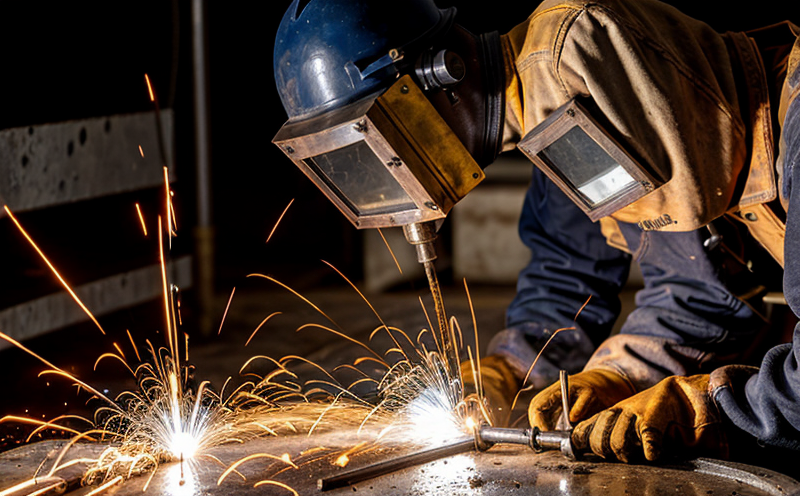ASTM E4 Calibration of Weld Testing Equipment
The ASTM E4 standard is pivotal in ensuring consistent and reliable measurement during welding processes. This service focuses on calibrating welding test equipment to meet the stringent requirements outlined by this international standard, which guarantees that the testing devices are accurate and precise.
Calibration of weld testing equipment plays a critical role in maintaining compliance with industry standards, enhancing product quality, and ensuring customer satisfaction. By adhering to ASTM E4, we ensure that all tests conducted on welding joints meet the highest quality benchmarks.
The process involves meticulous measurement checks and adjustments of the equipment used for various types of weld testing such as tensile strength, impact toughness, hardness, and bend testing. Each step in this calibration ensures that the test results are accurate and reliable, thereby safeguarding product integrity and safety.
Our team of experts uses state-of-the-art facilities equipped with high-precision instruments to perform ASTM E4 calibrations. This includes not only the equipment but also the testing procedures themselves. Our technicians follow stringent protocols to ensure that all measurements are traceable back to national standards.
The importance of calibration cannot be overstated in any welding or material joining process. Inaccurate or poorly calibrated equipment can lead to flawed test results, which might result in substandard products and potential safety hazards. By offering ASTM E4 calibration services, we help clients avoid these pitfalls while ensuring compliance with international regulations.
Our service covers a wide range of welding processes including butt welds, lap joints, fillet welds, and more. We also provide calibration for various types of testing equipment such as tensile testers, impact testers, hardness testers, and bend testers. This comprehensive approach ensures that every aspect of the welding process is thoroughly examined.
Understanding the nuances of ASTM E4 helps in selecting appropriate test methods and procedures. For instance, different types of weld joints require specific testing techniques to ensure they meet the required standards. Our technicians are well-versed in these requirements and can advise clients on the best practices for their particular welding processes.
Calibration is not a one-time task but rather an ongoing process that requires regular checks to maintain accuracy over time. This continuous effort ensures that the equipment remains reliable throughout its operational life, providing consistent results every time it is used. Regular calibration also helps in identifying any potential issues early on, allowing for timely repairs or replacements before they affect test outcomes.
By partnering with us for ASTM E4 calibration services, clients can rest assured knowing that their welding equipment is calibrated to the highest standards. This not only enhances product quality but also builds trust with customers who demand excellence in manufacturing processes. It further supports a culture of continuous improvement within organizations by identifying areas where improvements can be made.
The benefits extend beyond just meeting regulatory requirements; they encompass improved efficiency, reduced costs through fewer rework cycles, increased confidence among stakeholders, and enhanced reputation for quality and reliability. In today’s competitive market environment, these factors are crucial in maintaining a strong foothold in the industry.
Industry Applications
The ASTM E4 calibration of welding test equipment finds application across various industries where precise measurements are essential for ensuring product quality and safety. Aerospace, automotive manufacturing, pipeline construction, petrochemical processing, shipbuilding, and nuclear power generation all rely heavily on accurate weld testing.
- Aerospace: Ensuring that aircraft components are fabricated with flawless joints is critical to prevent failures in flight.
- Automotive Manufacturing: Precise calibration helps in producing vehicles with high structural integrity, enhancing safety standards.
- Pipeline Construction: The strength and reliability of pipeline welds directly impact public safety and environmental protection.
- Petrochemical Processing: Accurate testing ensures that storage tanks and processing equipment withstand harsh conditions without compromising safety or performance.
- Shipbuilding: Ships require robust hull structures for durability, which necessitates reliable welding processes backed by accurate calibrations.
- Nuclear Power Generation: Safety is paramount in nuclear facilities; thus, every component must be meticulously tested and calibrated to prevent accidents.
Quality and Reliability Assurance
The ASTM E4 calibration process contributes significantly to quality assurance by ensuring that all welding tests conducted meet the specified standards. This meticulous approach helps in identifying potential flaws early on, thereby preventing costly mistakes down the line.
Our rigorous testing procedures not only adhere to international standards but also go above and beyond them. This commitment ensures that our clients receive unparalleled service and peace of mind knowing their products are up to par with global benchmarks.
The use of advanced instrumentation and techniques guarantees accurate measurements, which is crucial for producing reliable results. These tests provide valuable insights into the performance characteristics of materials under different conditions, helping manufacturers make informed decisions about material selection and process optimization.
Our clients benefit from this enhanced level of quality assurance through improved product reliability, reduced defects, increased customer satisfaction, and ultimately better brand reputation. By focusing on these aspects, we contribute to a safer and more efficient manufacturing environment.





